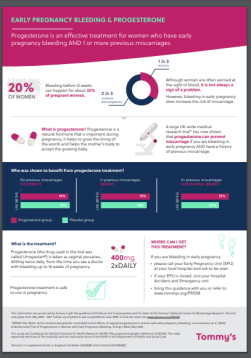This guideline provides evidence-based information on the use of forceps and vacuum extractor for both rotational and non-rotational operative vaginal deliveries. This is the fourth edition of this guideline, first published in October 2000 under the title Instrumental vaginal delivery, and revised in January 2011 and October 2005 under the title Operative Vaginal Delivery. Download the guidance here
Monthly Archives: May 2020
The PRISM trial – bleeding in early pregnancy & miscarriage
 Tommy’s National Centre for Miscarriage Research reports that the PRISM trial is complete. More information from Tommy’s on the trial is available here
Tommy’s National Centre for Miscarriage Research reports that the PRISM trial is complete. More information from Tommy’s on the trial is available here
When the results were split by the number of previous miscarriages that the participants had suffered, the analysis showed that:
- No previous miscarriages: the live birth rate was 74% (824/1111) in the progesterone group and 75% (840/1127) in the placebo group, ie no benefit
- 1-2 previous miscarriages: the live birth rate was 76% (591/777) in the progesterone group and 72% (534/738) in the placebo group, ie some benefit
- 3 or more previous miscarriages: the live birth rate was 72% (98/137) in the progesterone group and 57% (85/148) in the placebo group, ie substantial benefit
A new video, targeted at healthcare professionals, gives key information and recommendations for clinical practice based on the findings of the PRISM trial. The PRISM trial explored the role of progesterone as a treatment for recurrent miscarriage. View the video here
An infographic aimed at parents is available here
Progression to type 2 diabetes in women with a known history of gestational diabetes: systematic review and meta-analysis
Meta-analysis of 20 studies (n=67,956 with gestational diabetes mellitus [GDM],1,264,417 controls) found those with a history of GDM appear to have a~ 10-fold higher risk of developing type 2 than those with a normoglycaemic pregnancy (RR 9.51, 95% CI, 7.14 to 12.67, p<0.001).
Vounzoulaki Elpida, Khunti Kamlesh, Abner Sophia C, Tan Bee K, Davies Melanie J, Gillies Clare L et al. Progression to type 2 diabetes in women with a known history of gestational diabetes: systematic review and meta-analysis BMJ 2020; 369 :m136
NHS England Maternity leaflets now available in translated versions
RCOG Guidance for antenatal and postnatal services in the evolving coronavirus (COVID-19) pandemic updated
RCOG have produced version 2 of this guidance. Updates include new recommendations:
• Where services can support it, the NICE Schedule of Antenatal Care should
be maintained in its entirety.
• Services should review the ongoing impact of any changes to the schedule of
appointments, through local governance procedures.
• As early as possible when staffing allows, services should work towards
reinstating all appointments to return to pre-pandemic appointment
schedules.
• Services should consider the needs of vulnerable women, including those
who are more likely to develop severe complications from COVID-19, when
reorganising services.
Read the guidance here
RCOG Guidance for provision of midwife-led settings and home birth in the evolving coronavirus (COVID-19) pandemic updated
RCOG have produced version 1.2 of the guidance. Updates include the following:
When reorganising services, units should be particularly cognisant of emerging evidence that black, Asian and minority ethnic group (BAME) individuals are at particular risk of developing severe and life-threatening COVID-19. There is extensive evidence on the inequality of experience and outcomes for BAME women during pregnancy in the UK. Particular consideration should be given to the experience of women of BAME background and women living with multiple deprivation, when evaluating the potential or actual impact of any service change.’;
Inclusion of ‘Number of midwives needing to self-isolate or who are ‘shielded’ but who are able to provide virtual or non-patient-facing care’ among the staff groups;
Further detail added on the basis for making decisions around closing some birth settings.
Download the guidance here
New research on risks of COVID-19 to pregnant women (National Perinatal Epidemiology Unit (NPEU), University of Oxford)
Researchers from the NPEU, in collaboration with the Royal College of Obstetricians and Gynaecologists, the Universities of Leeds and Birmingham, Kings and Imperial Colleges London have published new research that suggests pregnant women are no more likely to become ill with severe COVID-19 than non-pregnant women. However, the majority of women who did become severely ill were in their third trimester of pregnancy, emphasising the importance of social distancing for this group.
Read a summary of the research here
Preprint publication: Characteristics and outcomes of pregnant women hospitalised with confirmed SARS-CoV-2 infection in the UK: a national cohort study using the UK Obstetric Surveillance System (UKOSS)
Read the RCOG and RCM response to the study here
Infant feeding during the coronavirus (Covid-19) crisis: A guide for local authorities (Unicef)

Unicef UK and First Steps Nutrition Trust have partnered together with the National Infant Feeding Network (NIFN), a network of over 700 infant feeding specialists, to produce this child rights-focused guidance for local authorities to ensure babies and families are protected during this crisis.
View their advice document here
COVID-19 maternal mental health guidance – aimed at expectant mums
Indicators related to under 18 conceptions, pregnancy and birth: 2020 update
Indicators in the Child and maternal health profiles and Sexual and reproductive health profiles have been updated. The indicators relate to conceptions, abortions and birth rates for women under 18 and conceptions for women under 16; ethnicity and age of mothers; admissions of babies aged under 14 days; deliveries by caesarean section; ectopic pregnancy and pelvic inflammatory disease. The profiles give data at a local, regional and national level to inform the development and provision of family planning, antenatal and maternity care.
Can opioids be used for pain relief during pregnancy?
UKMI have updated their Q&A which explores the data available to support the safety of prescribing opioids for pain relief in pregnancy. Download the document here
Vaginal preparation with antiseptic solution before cesarean section for preventing postoperative infections
A new Cochrane systematic review found
“Author’s conclusion: Vaginal preparation with povidone‐iodine or chlorhexidine solution compared to saline or not cleansing immediately before cesarean delivery probably reduces the risk of post‐cesarean endometritis, postoperative fever, and postoperative wound infection. Subgroup analysis found that these benefits were typically present whether iodine‐based or chlorhexidine‐based solutions were used and when women were in labor before the cesarean”
Haas DM, Morgan S, Contreras K, Kimball S. Vaginal preparation with antiseptic solution before cesarean section for preventing postoperative infections. Cochrane Database of Systematic Reviews 2020, Issue 4. Art. No.: CD007892. DOI: 10.1002/14651858.CD007892.pub7.

